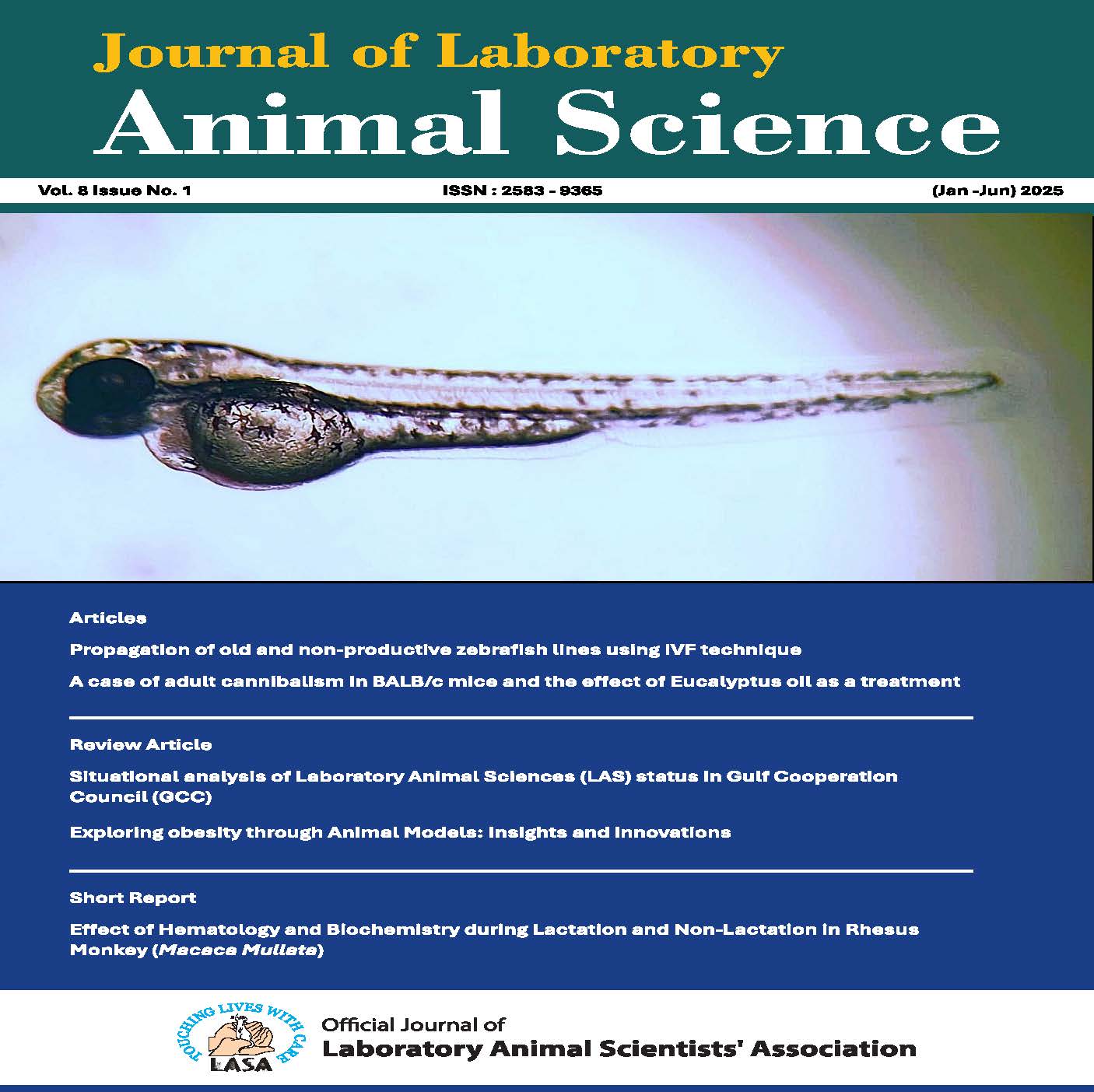Reporting of Mammary Tumours in Sprague Dawley/NIN Mutant (Hairless) Rat Strain.
DOI:
https://doi.org/10.48165/jlas.2024.7.2.4Keywords:
Hairless rat, Sprague Dawley, mammary tumourAbstract
A spontaneous genetic mutation in Sprague Dawley rats was detected at the ICMR-NIN animal facility. The spontaneously mutated rat was examined for body composition, serum biochemistry, peripheral blood CD4 and CD8 cell population, and spontaneous tumour growth. We observed the spontaneous development of tumours in 24 animals on crossbreeding. The animals showed no significant differences in vital organ structure as compared to the heterozygous animals. Interestingly, both homozygous (hairless) and heterozygous rats developed spontaneous fibroadenomas in their mammary glands during adulthood, which was distinct from the parent NIN/SD rat colony. Importantly, there was no connection between the biochemical and T cell population and the presence of these tumours. The histological characteristics of the tumours closely resembled mammary tumours in humans. In conclusion, the hairless SD rat model with thymus will serve as a valuable tool in cancer research, particularly in mammary tumour studies.
Downloads
References
1. Arnold, M., E. Morgan, H. Rumgay, A. Mafra, D. Singh, M. Laversanne, J. Vignat, J. R. Gralow, F. Cardoso, S. Siesling and I. Soerjomataram (2022). "Current and future burden of breast cancer: Global statistics for 2020 and 2040." The Breast 66: 15-23.
2. Beral, V., E. Banks, G. Reeves and D. Bull (2003). "Breast cancer and hormone-replacement therapy: the Million Women Study." J The Lancet 362(9392): 1330-1331.
3. Bu, W., L. Xin, M. Toneff, L. Li and Y. Li (2009). "Lentivirus vectors for stably introducing genes into mammary
epithelial cells in vivo." J Mammary Gland Biol Neoplasia 14(4): 401-404. 4. Burdall, S. E., A. M. Hanby, M. R. Lansdown and V. Speirs (2003). "Breast cancer cell lines: friend or foe?" Breast Cancer Res 5(2): 89-95. 5. Chajes, V. and I. Romieu (2014). "Nutrition and breast cancer." J Maturitas 77(1): 7-11.
6. Chan, M. M., X. Lu, F. M. Merchant, J. D. Iglehart and P. L. Miron (2007). "Serial transplantation of NMU induced rat mammary tumors: a model of human breast cancer progression." Int J Cancer 121(3): 474-
485.
7. Choudhury, B., R. Kandimalla, R. Elancheran, R. Bharali and J. Kotoky (2018). "Garcinia morella fruit, a promising source of antioxidant and anti-inflammatory agents induces breast cancer cell death via triggering apoptotic pathway." J. Biomedicine Pharmacotherapy 103: 562-573.
8. Coughlin, S. S. and D. U. J. C. e. Ekwueme (2009). "Breast cancer as a global health concern." 33(5): 315- 318.
9. Fisher, G. H., S. Orsulic, E. Holland, W. P. Hively, Y. Li, B. C. Lewis, B. O. Williams and H. E. Varmus (1999). "Development of a flexible and specific gene delivery system for production of murine tumor models." Oncogene 18(38): 5253-5260.
10. Hanf, V. and U. Gonder (2005). "Nutrition and primary prevention of breast cancer: foods, nutrients and breast cancer risk." J European Journal of Obstetrics Gynecology Reproductive Biology 123(2): 139-149.
11. Heston, W. E. and G. Vlahakis (1971). "Mammary tumors, plaques, and hyperplastic alveolar nodules in various combinations of mouse inbred strains and the different lines of the mammary tumor virus." Int J Cancer 7(1): 141-148.

